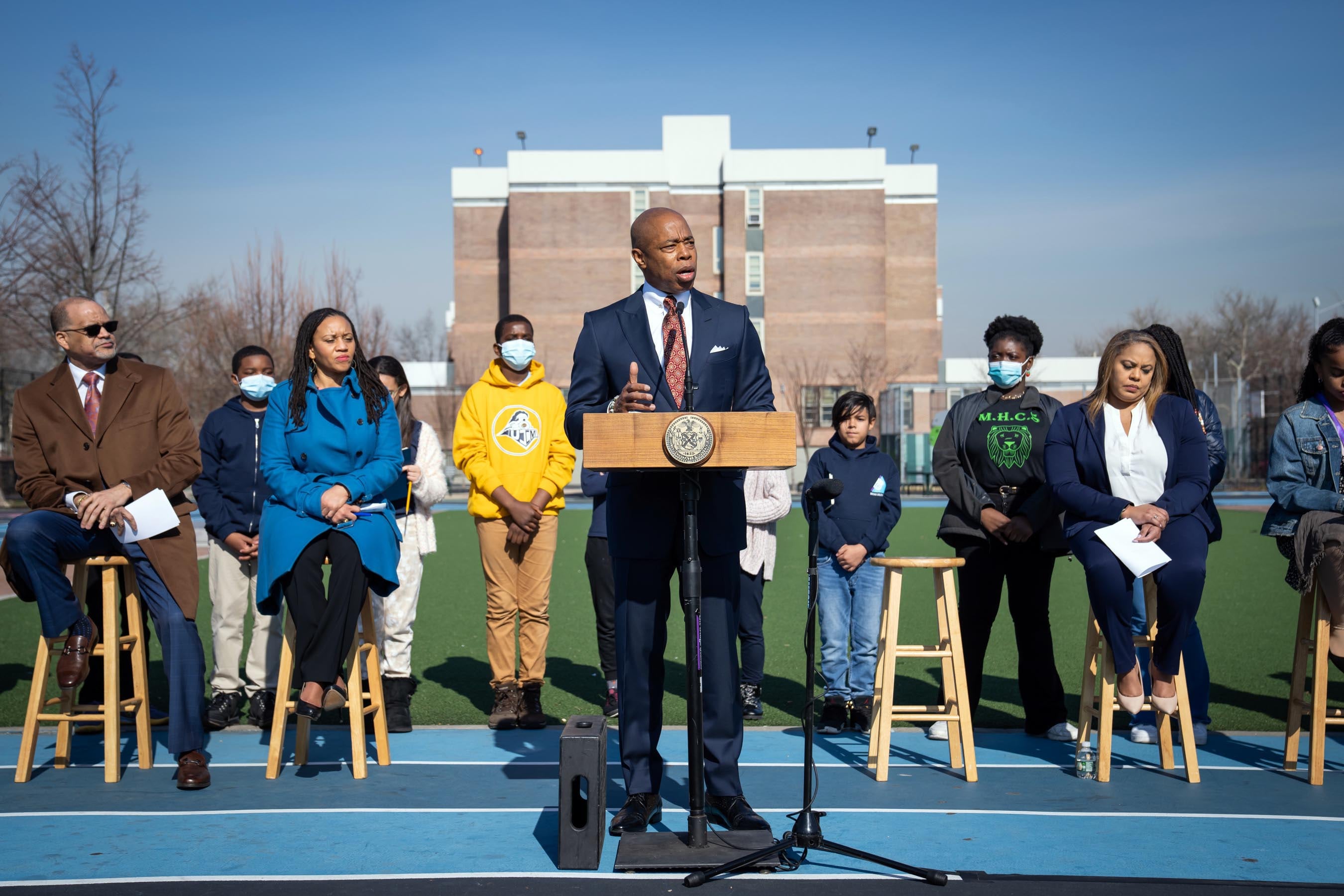Hours after announcing his nine members of the Panel for Educational Policy Tuesday, Mayor Eric Adams withdrew the appointment of controversial pastor Rev. Kathlyn Barrett-Layne, who has been accused of anti-gay comments.
The appointments also come amid questions of transparency, since the members have already participated in a public meeting and voted on school issues, even though their names had not been announced to the public. That meeting came weeks late — despite a state law requiring that the PEP convene monthly — as Adams had not finished the appointments.
The Adams administration has come under fire for appointing people with anti-LGBTQ views to other parts of city government. Barrett-Layne has written that being gay is a sin and equated it with pedophilia, according to a Daily News report, which also first reported of her removal. Another member the mayor appointed to the education council: Greg Faulkner, who worked for a councilman who in 2014 infamously supported Ugandan anti-gay laws while on a trip there.
A spokesperson for City Hall said they were unaware of the reverend’s writings, and that they asked her to resign.
Other appointees include multiple members with ties to charter schools, as well as Tom Allon, the father of the mayor’s deputy press secretary, Politico reported. Neither the mayor’s office nor the deputy press secretary, Jonah Allon, would confirm.
The appointments come a day ahead of the next scheduled PEP meeting — and as Adams tries to convince state lawmakers to renew the state law that gives him power over most education policy decisions in the nation’s largest school system. The makeup of the PEP has been under scrutiny as part of the debate over the future of mayoral control.
“This seems like a serious misstep that could undermine the arguments that the mayor may want to make to retain mayoral control — just the bad judgment and the lack of transparency,” said Aaron Pallas, chair of the department of education policy and social analysis at Columbia University’s Teachers College.
In addition to the mayor’s nine appointees, the rest of the 15-member panel are selected by the borough presidents, and by the parents who serve on local Community Education Councils.
While the panel is structured to give the mayor authority over the city’s education department – in addition to naming a majority of the members, he can remove them at will – appointees have occasionally bucked the executive’s wishes. It is also one of the few places parents and other education advocates can gather to publicly press their case on issues from fighting school closures to pushing for disciplinary changes.
“Parent and community engagement is an essential component of my vision for education in New York City, and that is why I’m excited to begin what I know will be an effective and fruitful partnership with the panel members announced today,” Adams said in a statement.
The mayor’s appointees were already taking votes last month. City Hall ignored repeated requests for information about who was on the panel until posting the names online Tuesday afternoon. Asked why the mayor’s appointees were not announced earlier, City Hall spokesperson Amaris Cockfield wrote: “No appointment is confirmed until it’s announced.”
The public did not know who the members were beyond a cursory roll call at the beginning of a Feb. 16 virtual meeting that was often hard to hear because of technical problems.
NeQuan McLean, a parent advocate in Brooklyn’s District 16, said the timing of the appointments was worrisome.
“I don’t understand how… he’s now naming these members,” he said. “This is concerning, that the day before the second PEP meeting – which should have been the third PEP meeting – this list is coming out.”
McLean, a staunch supporter of reforms to mayoral control, also took issue with the fact that many of the new members have ties to charter schools, which some advocates accuse of siphoning resources from city-run schools.
“This is another example of why mayoral control does not work, to appoint this many people who have not invested in the system as they should have,” McLean said.
Pallas said that naming so many members with charter school ties is puzzling, since those schools — which are public, but run privately — are one area of education in New York City that the mayor has little control over.
Adams is pushing the state legislature to renew mayoral control, the law that gives him authority over the city’s schools. But advocates have been trying to claw back some of that authority, partly by giving the public more input and control over who is appointed to the PEP, or giving members more independence by implementing term limits.
“Part of the question about how to govern our public schools in New York City going forward is this question of what the role of the PEP should be, and how it should be constituted,” said Sen. John Liu, who chairs the New York City education committee. “The mayor has all the cards, no matter who these appointees are, under the current system.”
Read the full list of the mayor’s appointees in the city’s press release.
Alex Zimmerman contributed.
Christina Veiga is a reporter covering New York City schools with a focus on school diversity and preschool. Contact Christina at cveiga@chalkbeat.org.





